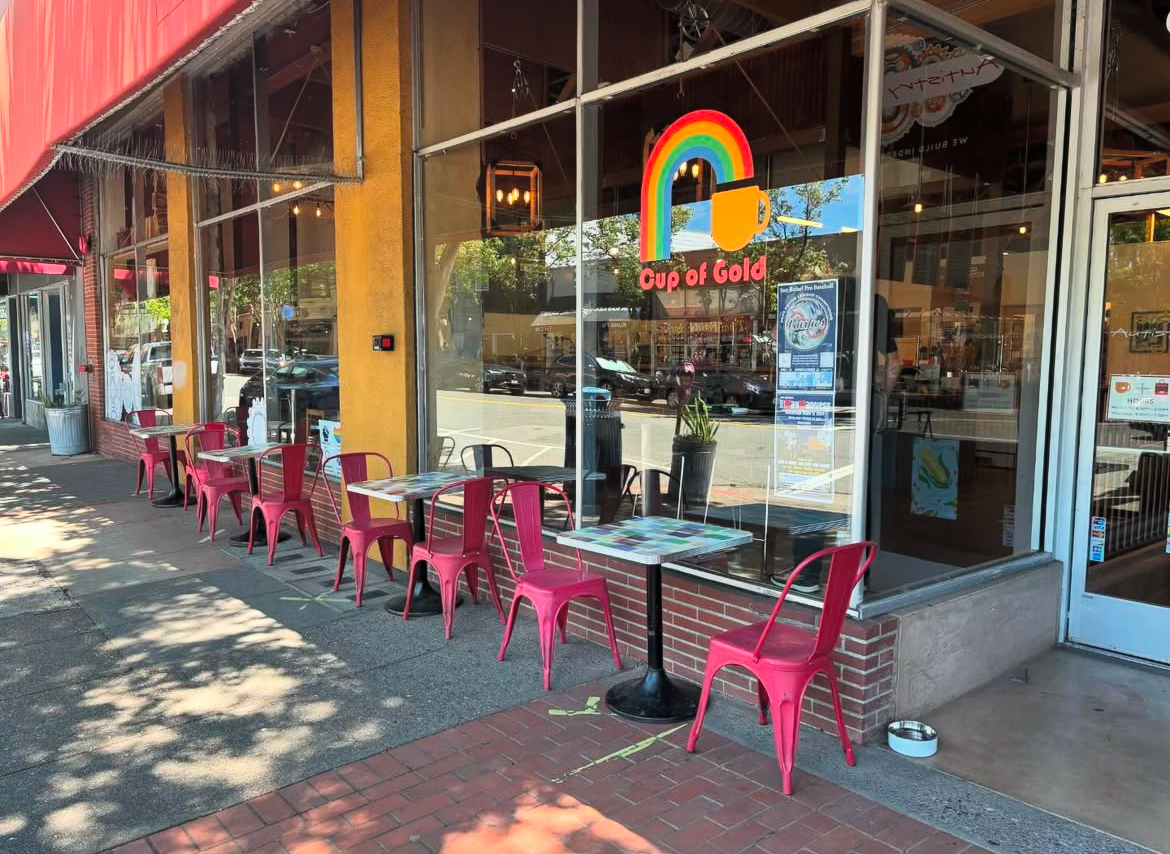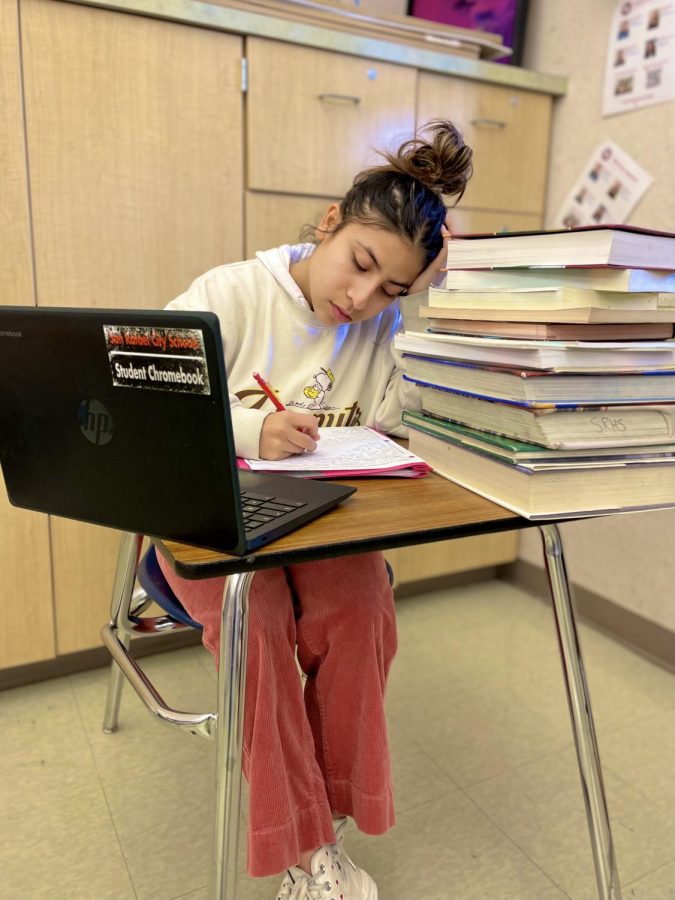First-Generation Students of Color Face Struggles and Hardships Many Others Would Never Understand
February 9, 2023
Writers Note: In order to write about all of these vulnerable experiences I focused on interviewing first-generation students of color at San Rafael High School who are all seniors that are soon finishing high hchool and heading off to college. Huge thanks to everyone who contributed to their personal experiences to make this article possible. It is greatly appreciated.
It was the look in my parents’ eyes, feeling like they’d let me down because they didn’t know how to help my stress, that really helped me understand their struggles and hardships. But that was completely contradicted once they would also say, “You have no reason to be upset over school.”
They claim it is easy, because to them it should be my only focus and priority, yet, they never even got to experience obtaining an education. They aren’t experts on what I do as a student.
It is the ongoing feeling of being misunderstood whenever my academic or even personal struggles are brought up. Just because you bring home good grades, it doesn’t mean it was easy and just because you’re one of the first in your family to go to college doesn’t mean it was a walk in the park to get there.
“We have no actual guidance of a pathway to success we long for,” said Diana Yax, a senior. “It has been an endless cycle filled with trial and error and questioning others while trying to find my very own pathway.”
This ongoing burden of feeling the need to be one of the first in your family to succeed in all aspects of life and feeling guilty if you don’t, has always been a struggle for we first-generation students of color in a household filled with immense pressure. This is deeply emphasized in a past article from a former SRHS journalist who addresses a similar issue.
“We have no one to tell us that our freshman year actually matters, and no one to tell us to get involved or to take all of these honors and advanced placement classes,” said Stephanie Mendez.
With more than 72% of the students being a minority and more than 59% of the students at San Rafael High School being economically disadvantaged, it is likely that more than half of the students currently enrolled at SRHS are first generation.
We encounter tons of obstacles and require more academic support, which is why programs like AVID, First Generation Scholars, Forwards, Aim High, 10,000 Degrees, and Compass exist.
Most of our parents come from poverty, working in the fields, not being able to receive any form of education (sometimes not knowing even how to read or write), speaking little to no English, being unemployed, or even having multiple jobs due to the lack of resources and opportunities back in their home countries and the expensive cost of living here.
The American Dream explains why they even came to this country in the first place, and even if they were not able to obtain that dream for themselves, most still have desire and hope for their very own children to some day reach that dream, and overall a successful lifestyle. Whether their children were brought here at a young age or planned to have them after they’d arrived in the United States, these parents still have high expectations. Growing up in a country filled with aspirations and dreams is nothing compared to a lot of the circumstances our own parents grew up in.
“Those whose parents were born and grew up in this country have a great step ahead with much more experience and opportunity,” Diana also said. “As a Latinx student, it can be intimidating voicing your opinion and being a part of communities you don’t feel welcome in but it’s also even more intimidating being born into a country knowing that has so much to provide yet so little that we know of.”
Brayan Hernandez explains that he feels the constant pressure of feeling like he needs to be something great, like a doctor or lawyer, so that he doesn’t have to struggle the way his parents did to get where they are today. This is also applicable to most other immigrant groups throughout history as well. Therefore, tons of other first-generation students from all backgrounds experience the great pressure from parents who scrape by wanting their kids to be lucrative and have these stereotypical successful careers.
Brayan isn’t not alone. There is research that shows how others feel the same about this immense pressure as well and as a result of that a lot of these students are faced with mental illness. According to a study published in the Journal of Psychoactive Drugs Latinx students are more likely to adopt unhealthy behaviors like unhealthy drug use or alcohol consumption to help cope.
We are perceived as geniuses or experts just because we’re simply obtaining an education and we experience an immense amount of constant pressure, yet little do our parents know, school doesn’t teach us how to survive out in the real world. This inflated expectation is created when our parents see us taking difficult classes like Pre Calc and Physics yet most weren’t even able to obtain past an elementary school level education.
A student that wishes to remain anonymous expresses how they feel within a classroom and their personal academic disadvantages that other first generation students of color can also relate to. “I feel like a slow learner around my white classmates. We learn the same things, with the same teacher, yet they seem to do better and actually understand the concept of the material,” they said.
It is no secret that it is hard trying to paint this perfect person that people expect you to be, and with that comes being overwhelmed and stressed. These emotions are completely normal to be feeling, yet due to comparison with our own parents’ struggles, like their need to work endless hours, students feel as if their emotions aren’t valid.
“I have no right to feel stressed and tired as my parents constantly overwork themselves for our family, yet don’t ever complain,” said Jennifer Cifuentes. “School is easy compared to the sacrifices they go through on a daily basis.”
Not to mention figuring out how to apply to college and financial aid. As well as dealing with SAT and ACT testing and passing AP/HP classes. With no help or even resources from people at home or those that you know, it can get really tough.
Despite all of the downsides we’ve encountered, on the bright side, first-generation students are glad and thankful that they’ve gotten to figure out all of this educational stuff so that their younger siblings and perhaps their very own children in the future don’t have to go through the same struggles that they did alone.
This has also made us very independent in the sense that it’s allowed us to find ourselves by creating our own pathways to success.
Our parents are the reason we’re here in this country filled with opportunity and that explains why all of us hope to make them immensely proud and even have them crying tears of joy as we walk across the stage at our college graduations.
We do it for our parents who came to this country with nothing and yet they still make it possible to give us all that we need. All of our accomplishments are also theirs.
“I feel like I owe them so much more than I could ever repay or give back,” said Madelin Reyes.






































